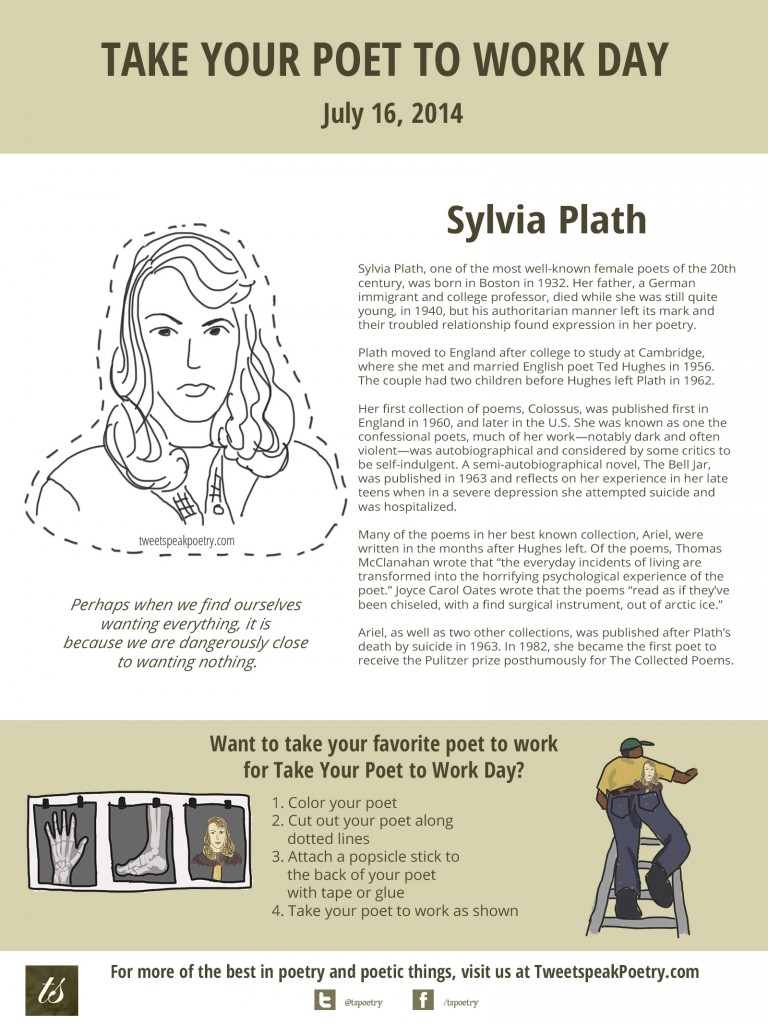What if you could take your favorite poet to work with you? Imagine finding a poet in your cash drawer when you open it to make change. Or think about how much fun you could have with your favorite poet answering all your calls for the day. We can’t wait to see what our favorite poets will be doing in your workplaces on Take Your Poet to Work Day.
Take Your Poet to Work Day is coming July 16
To help you play and celebrate with us, we’re releasing poets each week in a compact, convenient format you can tuck in your pocket, tool belt, or lunchbox. Last year, we gave you Sara Teasdale, Pablo Neruda, T. S. Eliot, Rumi, Edgar Allan Poe, and the reclusive Emily Dickinson (for folks who work at home). We even released a full collection, The Haiku Masters: Matsuo Basho, Yosa Buson, and Kobayashi Issa.
This year, we’re building on the collection, adding one new poet each Wednesday, up until the big day. We started the celebration over the past few weeks with Langston Hughes, Adrienne Rich, John Keats, William Butler Yeats, and Christina Rossetti. Today, we introduce a 20th-century American poet, Sylvia Plath.
Take Your Poet to Work Day is just one week from today! Get all the details and a shareable infographic about Take Your Poet to Work Day.
Take Your Poet to Work: Sylvia Plath
Click here for a downloadable version of Sylvia Plath Take Your Poet to Work Day Printable that you can print, and color and cut out for the big day.
Sylvia Plath
Sylvia Plath, one of the most well-known female poets of the 20th century, was born in Boston in 1932. Her father, a German immigrant and college professor, died while she was still quite young, in 1940, but his authoritarian manner left its mark and their troubled relationship found expression in her poetry.
Plath moved to England after college to study at Cambridge, where she met and married English poet Ted Hughes in 1956. The couple had two children before Hughes left Plath in 1962.
Her first collection of poems, Colossus, was published first in England in 1960, and later in the U.S. She was known as one the confessional poets, much of her work—notably dark and often violent—was autobiographical and considered by some critics to be self-indulgent. A semi-autobiographical novel, The Bell Jar, was published in 1963 and reflects on her experience in her late teens when in a severe depression she attempted suicide and was hospitalized.
Many of the poems in her best known collection, Ariel, were written in the months after Hughes left. Of the poems, Thomas McClanahan wrote that “the everyday incidents of living are transformed into the horrifying psychological experience of the poet.” Joyce Carol Oates wrote that the poems “read as if they’ve been chiseled, with a find surgical instrument, out of arctic ice.”
Ariel, as well as two other collections, was published after Plath’s death by suicide in 1963. In 1982, she became the first poet to receive the Pulitzer prize posthumously for The Collected Poems.
Morning Song
Love set you going like a fat gold watch.
The midwife slapped your footsoles, and your bald cry
Took its place among the elements.
Our voices echo, magnifying your arrival. New statue.
In a drafty museum, your nakedness
Shadows our safety. We stand round blankly as walls.
I’m no more your mother
Than the cloud that distills a mirror to reflect its own slow
Effacement at the wind’s hand.
All night your moth-breath
Flickers among the flat pink roses. I wake to listen:
A far sea moves in my ear.
One cry, and I stumble from bed, cow-heavy and floral
In my Victorian nightgown.
Your mouth opens clean as a cat’s. The window square
Whitens and swallows its dull stars. And now you try
Your handful of notes;
The clear vowels rise like balloons.
Mad Girl’s Love Song
I shut my eyes and all the world drops dead;
I lift my lids and all is born again.
(I think I made you up inside my head.)
The stars go waltzing out in blue and red,
And arbitrary blackness gallops in:
I shut my eyes and all the world drops dead.
I dreamed that you bewitched me into bed
And sung me moon-struck, kissed me quite insane.
(I think I made you up inside my head.)
God topples from the sky, hell’s fires fade:
Exit seraphim and Satan’s men:
I shut my eyes and all the world drops dead.
I fancied you’d return the way you said,
But I grow old and I forget your name.
(I think I made you up inside my head.)
I should have loved a thunderbird instead;
At least when spring comes they roar back again.
I shut my eyes and all the world drops dead.
(I think I made you up inside my head.)
Learn more about Take Your Poet to Work Day and our featured poets
Check out our Poetry at Work Day Infographic and help spread the word
Discover more Poets and Poems
Post and illustrations by LW Lindquist.
________________________
Take a poet to work every weekday morning with a subscription to Every Day Poems, the most beautiful and convenient way to read a poem a day
- Earth Song Poem Featured on The Slowdown!—Birds in Home Depot - February 7, 2023
- The Rapping in the Attic—Happy Holidays Fun Video! - December 21, 2022
- Video: Earth Song: A Nature Poems Experience—Enchanting! - December 6, 2022


L.L. Barkat says
How do you do it? You totally caught the Plath look. (She’s a force to be reckoned with, both visually and in her poems 🙂
Speaking of which, great poems.
Laura Brown says
It’s that one arched eyebrow.